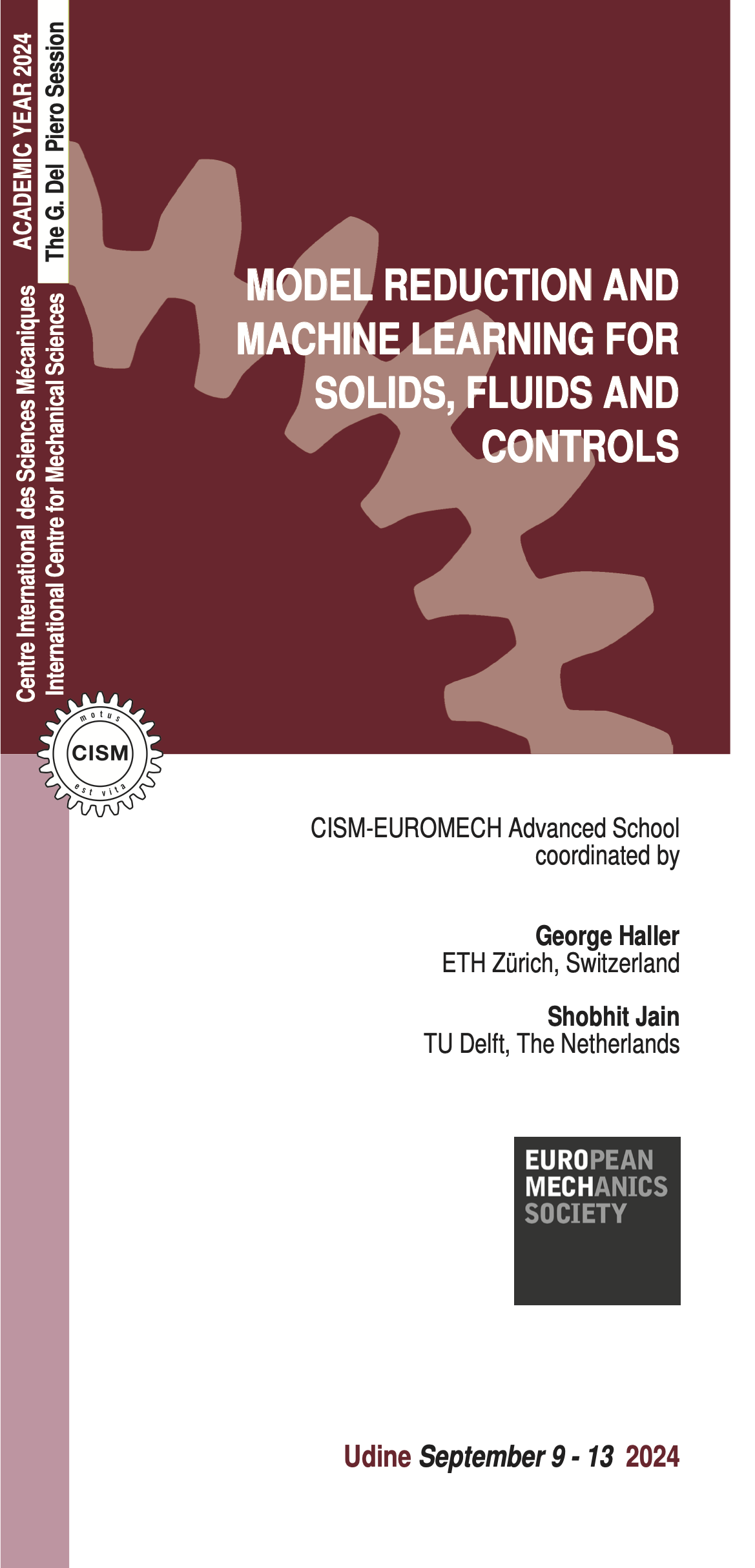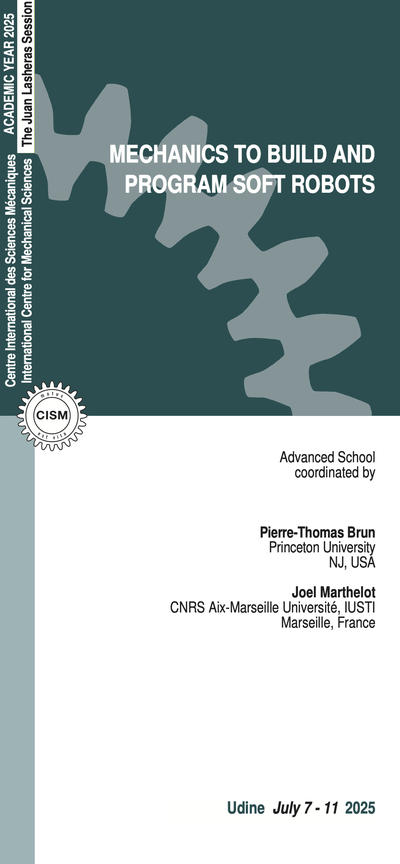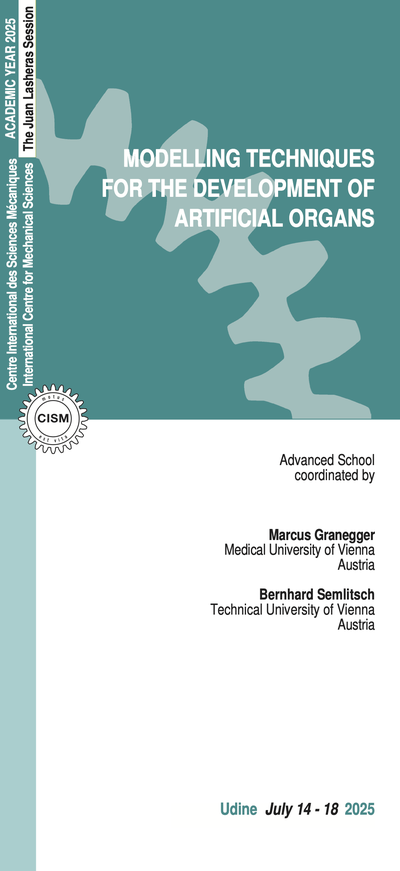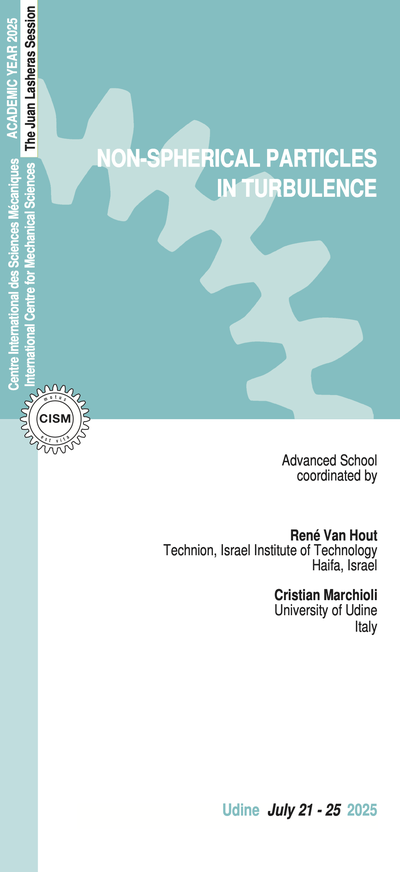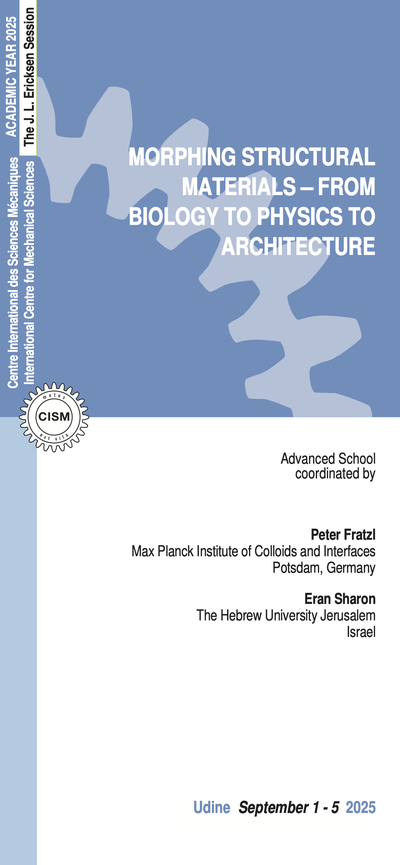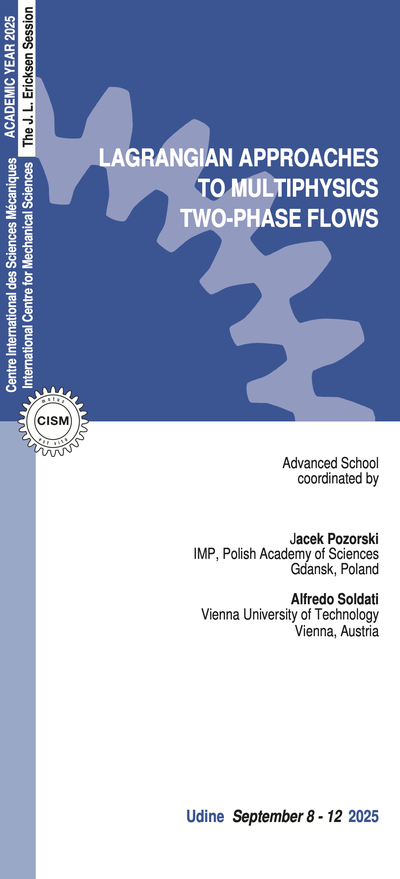The complexity of physical processes of interest to contemporary science and engineering continues to grow. As a result, one needs to describe these processes with high-dimensional governing equations, which sometimes are not fully known. For the analysis, prediction, design and control of such processes, there is a broad need for reduced-order models capturing the core of the underlying physical phenomena from equations or data. However, most of these phenomena are characteristically nonlinear, and hence there is no generally applicable mathematical procedure to separate their core behavior from the rest.
This proposed summer course brings together experts in model reduction to introduce participants to the current state of the art in equation-driven and/or data-driven nonlinear model reduction. The emphasis will be on applications of practical relevance, as opposed to simple toy examples. Students will gain insights into at least three major reduced-order modelling approaches: advanced projection-based methods, invariant manifold methods and neural-network based methods. The lectures will touch on both the theoretical basis and the numerical implementation of these approaches. The lecturers include Professors Balakumar Balachandran, Charbel Farhat, Michael Graham, George Haller, Shobhit Jain and Gianluigi Rozza.
Some of the introductory lectures will cover the notion of various low-dimensional invariant manifolds (such as inertial manifolds, attractors and spectral submanifolds) that provide a mathematical foundation for model reduction in high-dimensional nonlinear dynamical systems. A separate tutorial will be offered to the course participants on the use of available open-source codes that can be used to compute reduced-order models from equations (SSMTool) and data (SSMLearn) for various problems in solid mechanics, fluid dynamics, and controls. Several lectures will cover contemporary, neural-network-based modelling techniques for applications in fluids, solids, and controls. As opposed to providing black-box-type approaches, this course will feature systematic uses of neural networks in the discovery and interpolation of low-dimensional invariant sets, such as inertial manifolds or chaotic attractors.
Further lectures will be devoted to the use of neural networks in model-based prediction of critically important societal phenomena, such as the spread of infections in a pandemic or the emergence of highly destructive rogue waves in the ocean. Physics-informed neural networks and their applications to the reduced-order numerical solutions of continuum motion modeled by PDEs will be discussed. Additionally, certified reduced basis methods will be introduced to the students with applications to transport and continuum mechanics. Recent reduction methods aimed at very large systems, such as hyperreduction and moment-matching methods, will also be surveyed.
M. Cenedese, J. Axås, B. Bäuerlein, K. Avila & G. Haller, Data-driven modeling and prediction of non-linearizable dynamics via spectral submanifolds. Nat. Commun. 13 (2022) 872.
G. Haller, S. Jain & M. Cenedese, Dynamics-based machine learning for nonlinearizable phenomena. Data-driven reduced models on spectral submanifolds SIAM News 55/5 (2022) 1-4.
S. Jain & G. Haller, How to compute invariant manifolds and their reduced dynamics in high-dimensional finite-element models? Nonlinear Dyn. 107, (2022) 1417–1450.
M. Li, S. Jain & G. Haller, Nonlinear analysis of forced mechanical systems with internal resonance using spectral submanifolds, Part I: Periodic response and forced response curve. Nonlinear Dyn. 110 (2022) 1005–1043.
X. Liu, X. Zheng, and B. Balachandran, COVID-19: Data-driven dynamics, statistical and distributed delay models, and observations, Nonlinear Dyn. 101 (2020) 1527-1543.
T. Breunung and B. Balachandran, Data-driven, high resolutions ocean wave forecasting and extreme wave predictions, Ocean Eng. 268 (2023) 113271.
D. Floryan, & M. D. Graham. Data-driven discovery of intrinsic dynamics. Nat. Mach. Intell. 4 (2022) 1113–1120.
A. J. Linot, K. Zeng & M. D. Graham. Turbulence control in plane Couette flow using low-dimensional neural ODE-based models and deep reinforcement learning. Int. J. Heat Fluid Flow 101 (2023) 109139.
G. Rozza, G. Stabile and F. Ballarin, Advanced Reduced Order Methods and Applications in Computational Fluid Dynamics, SIAM, PA (2022). J. Hesthaven, G. Rozza and B. Stamm, Certified Basis Methods for Parametrized Partial Differential Equations, Springer Briefs in Mathematics (2015).
U. Hetmaniuk, R. Tezaur and C. Farhat, Review and assessment of interpolatory model order reduction methods for frequency response structural dynamics and acoustics problems, Int. J. Num. Meth. Eng. 90, (2012) 1636-1662.
J. Barnett, C. Farhat and Y. Maday, Neural-network-augmented projection-based model order reduction for mitigating the Kolmogorov barrier to reducibility, J Comp. Phys. 492 (2023) 112420.
6 lectures on: Data-based system identification, modeling and forecasting for complex mechanical systems; applications to flapping-wing systems and flutter; forecasting rogue waves from data, stochastic interference; forecasting complex dynamics from surrogate models, using neural networks to predict chaotic dynamics.
6 lectures on: proper orthogonal decomposition (POD); moment matching methods; local approaches for parametric PDEs based on interpolation on quotient and embedded manifolds; the least-squares Petrov-Galerkin method; nonlinear approximation manifolds; and hyperreduction.
6 lectures on: The use of nonlinear dynamical systems, data science and machine learning to model turbulent shear flows; coherent states and turbulent dynamics; data-driven identification of dimension and structure of invariant manifolds using machine learning; wall-turbulence prediction and control using neural ODE models; extreme event prediction with multi-chart representations.
6 lectures on: Dynamical systems view on nonlinear model reduction; theory and computation of spectral submanifolds; locating low-dimensional attracting invariant manifolds from equations and data; applications to transitions in fluids, system identification in structural vibrations and controller design for soft robotics.
6 lectures on: Equation-driven and data-assisted model reduction for large finite-element models; computing invariant manifolds efficiently in very high-dimensional problems; tutorial on SSMTool (open-source nonlinear model reduction code for equations) and SSMLearn (open-source nonlinear model reduction code for data).
6 lectures on: Computational reduction for PDEs; advanced projection-based model reduction methods in structural dynamics; machine learning for reduced-order modelling of inverse problems, reduced basis method, neural networks for boundary parametrization, dimensionality reduction and solution manifold approximation.
ADMISSION AND ACCOMMODATION
The course is offered in a hybrid format, allowing participants the flexibility to attend either in person or remotely via the Microsoft Teams platform.
Limited spots are available for on-site attendance and will be allocated on a first-come, first-served basis.
The registration fees are:
- On-site participation: 600.00 Euro + VAT*
Includes a complimentary bag, five fixed menu buffet lunches, hot beverages, downloadable lecture notes.
Deadline for on-site application is August 9, 2024.
- Live Streaming Online Participation: 250.00 Euro + VAT*
Includes downloadable lecture notes.
Deadline for online application is August 28, 2024.
Application forms should be submitted online through the website: http://www.cism.it.
A confirmation message will be sent to accepted participants.
Upon request, a limited number of on-site participants can be accommodated at CISM Guest House at the price of 35 Euro per person/night (contact: foresteria@cism.it)
* where applicable (bank charges are not included) - Italian VAT is 22%.
CANCELLATION POLICY
Applicants may cancel their registration and receive a full refund by notifying the CISM Secretariat in writing (via email) no later than:
- August 9, 2024 for on-site participants (no refunds after the deadline);
- August 28, 2024 for online participants (no refunds after the deadline).
Cancellation requests received before these deadlines will be subject to a 50.00 Euro handling fee. Incorrect payments are also subject to a 50.00 Euro handling fee.
GRANTS
A limited number of participants from universities and research centres who do not receive support from their own institutions can request a waiver of the registration fee and/or free lodging.
Requests should be sent to the CISM Secretariat (mail to: info@cism.it)by July 9, 2024 along with the applicant's curriculum vitae and a letter of recommendation from the head of the department or a supervisor confirming that the institute cannot provide funding. Preference will be given to applicants from countries that sponsor CISM.
